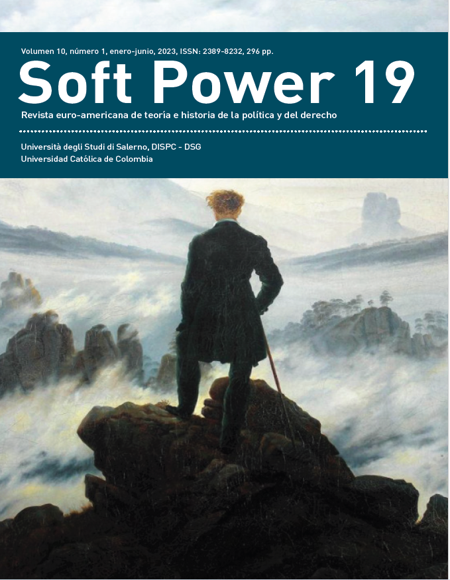
Este trabalho está licenciado sob uma licença Creative Commons Attribution-NonCommercial 4.0 International License.
Al enviar los artículos para su evaluación, los autores aceptan que transfieren los derechos de publicación a Soft Power. Revista Soft Power para su publicación en cualquier medio. Con el fin de aumentar su visibilidad, los documentos se envían a bases de datos y sistemas de indización, así mismo pueden ser consultados en la página web de la Revista.Resumo
En los últimos años, un número significativo de contribuciones provenientes de diferentes campos de estudio están desarrollando una comprensión de la ecología política más allá de la bifurcación moderna entre sociedad y medio ambiente. Donna Haraway, Bruno Latour e Isabelle Stengers ocupan un lugar destacado en el debate contemporáneo. En este artículo exploro una red de conceptos clave, como política terrestre, Chthulucene y cosmopolítica, como un atractivo para pensar la ecología política en el continuo humano-no-humano. Estas tres perspectivas me están ayudando a quedarme con tres problemáticas clave en la política contemporánea: la necesidad de pensar un tercer espacio político frente y más allá del nacionalismo regresivo y el globalismo verde, los procesos de politización de un ambientalismo cotidiano en ascenso y la pragmática capaz de nutrir alianzas transversales, composiciones y coaliciones entre singularidades divergentes y movimientos socioecológicos en el tiempo de las intrusiones de Gaia.

Referências
Almassi, B. (2017). Climate Change and the Need for Intergenerational Reparative Justice.
Journal of Agricultural and Environmental Ethics, 30(2), 199-212. doi:10.1007/
s10806-017-9661-z
Bacon, J. M. (2018). Settler colonialism as eco-social structure and the production of
colonial ecological violence. Environmental Sociology, 5(1), 59-69. doi:10.1080/2325
2018.1474725
Barad, K. (2007). Meeting the universe halfway. Quantum physics and the entanglement
of matter and meaning. Duke University Press.
Bennet, J. (2010). Vibrant Matter. A Political Ecology of Things. Duke University Press.
Braun, B. & S. J. Whatmore. (2010a). The stuff of politics: an introduction. In B. Braun
& S. J. Whatmore (Eds.), Political Matter. Technoscience. Democracy and Public Life
(ix-xl). University of Minnesota Press.
Braun, B. & S. J. Whatmore (Eds.). (2010b). Political Matter. Technoscience. Democracy
and Public Life. University of Minnesota Press.
Chakrabarty, D. (2021). the Climate of History in a Planetary Age. The University of
Chicago Press.
Coole, D. & S. Frost. (2010). New Materialisms. Ontology, Agency, and Politics. Duke
University Press.
Crutzen, P. J. (2002). Geology of mankind. Nature(415), 23.
Du Bois, W. E. B. (1964). Black reconstruction in America. An essay toward a history of
the part which black folk played in the attempt to reconstruct democracy in America,
-1880. Meridian Books.
Fanon, F. (2004). The wretched of the earth (R. Philcox, Trans.). Grove Press.
Ghelfi, A. (2022a). La condizione ecologica. EdiFir.
Ghelfi, A. (2022b). New Peasantries in Italy: Eco-commons, Agroecology and Food
Communities. In D. Papadopoulos, M. Puig de la Bellacasa & M. Tacchetti (Eds.),
Ecological Reparation. Repair, Remediation and Resurgence in Social and Environmental
Conflict (194-207). Bristol University Press.
Ghelfi, A. & D. Papadopoulos. (2021). Ungovernable Earth: Resurgence, Translocal Infrastructures
and More-than-Social Movements. Environmental Values, 30(1).
Ghelfi, A. & D. Papadopoulos. (2023). More-Than-Social Movements: Politics of Matter,
Autonomy, Alterontologies. In L. Pellizzoni, Asara (Ed.), Handbook of Critical Environmental
Politics (505-519). Edward Elgar Publisher.
Haraway, D. (1991). Manifesto cyborg. Donne, tecnologie e biopolitiche del corpo. .
Haraway, D. (2016). Staying with the Trouble. Making Kin in the Chthulucene. Duke
University Press.
Haraway, D. (2019). Chthulucene. Sopravvivere su un pianeta infetto. Nero.
Haraway, D. J. (1997). Modest_Witness@Second_Millennium. FemaleMan©_Meets_OncoMouse
™ : feminism and technoscience. Routledge.
Holbraad, M., M. A. Pedersen & E. Viveiros de Castro. (2014). The Politics of Ontology:
Anthropological Positions. Fieldsights. Retrieved from http://culanth.org/fieldsights/
-the-politics-of-ontology-anthropological-positions
Kohn, E. (2013). How Forests Think. Toward an Anthropology beyond the Human. University
of California Press.
Latour, B. (1993). We have never been modern. Harvard University Press.
Latour, B. (2005). Reassembling the social: an introduction to actor-network-theory. Oxford
University Press, UK.
Latour, B. (2018). Down to Earth: Politics in the New Climatic Regime. Polity Press.
Latour, B. (2020). La sfida di Gaia. Il nuovo regime climatico. Meltemi editore.
Latour, B. & N. Schultz. (2022). On the Emergence of an Ecological Class. A Memo. Polity
Press.
Macleod, C. I., S. Beynon-Jones & M. Toerien. (2017). Articulating reproductive justice
through reparative justice: case studies of abortion in Great Britain and South Africa.
Cult Health Sex, 19(5), 601-615. doi:10.1080/13691058.2016.1257738
Margulis, L. (2007). Power to the Protoctists. In L. Margulis & D. Sagan (Eds.), Dazzle
Gradually: Reflections on the Nature of Nature (29-35). Chelsea Green Publishing.
Papadopoulos, D. (2018). Experimental Practice. Technoscience, Alterontologies, and
More Than Social Movements. Duke University Press.
Perez Murcia, L. E. (2014). Social Policy or Reparative Justice? Challenges for Reparations
in Contexts of Massive Displacement and Related Serious Human Rights
Violations. Journal of Refugee Studies, 27, 191-206. doi:10.1093/jrs/fet028
Puig de la Bellacasa, M. (2014). Encountering Bioinfrastructure: Ecological Struggles
and the Sciences of Soil. Social Epistemology, 28(1), 26-40. doi:10.1080/02691728.2
862879
Puig de la Bellacasa, M. (2017). Matters of Care. Speculative Ethics in More Than Human
Worlds. University of Minnesota Press.
Rancière, J. (1998). Disagreement : politics and philosophy. University of Minnesota
Press.
Stengers, I. (2005). The cosmopolitical proposal. In B. Latour & P. Weibel (Eds.), Making
Things Public. Atmospheres of Democracy (994-1003). The MIT Press.
Stengers, I. (2010). Cosmopolitics I. University of Minnesota Press.
Stengers, I. (2011). Cosmopolitics II. University of Minnesota Press.
Stengers, I. (2015). In Catastrophic Times. Resisting the Coming Barbarism. Open Humanities
Press/Meson Press.
Stengers, I. (2017). Autonomy and the Intrusion of Gaia. South Atlantic Quarterly,
(2), 381-400.
Tsing, A. L. (2015). The Mushroom at the End of the World: On the Possibility of Life in
Capitalist Ruins. Princeton University Press.
Viveiros de Castro, E. (2015). Cannibal Metaphysics: For a Post-structural Antropology.
Univocal.
Walker, M. U. (2010). What is reparative justice? Marquette University Press.
White, R. (2016). Reparative justice, environmental crime and penalties for the powerful.
Crime, Law and Social Change, 67(2), 117-132. doi:10.1007/s10611-016-9635-5
Whyte, K. (2018). Settler Colonialism, Ecology, and Environmental Injustice. Environment
and Society, 9(1), 125-144. doi:10.3167/ares.2018.090109







